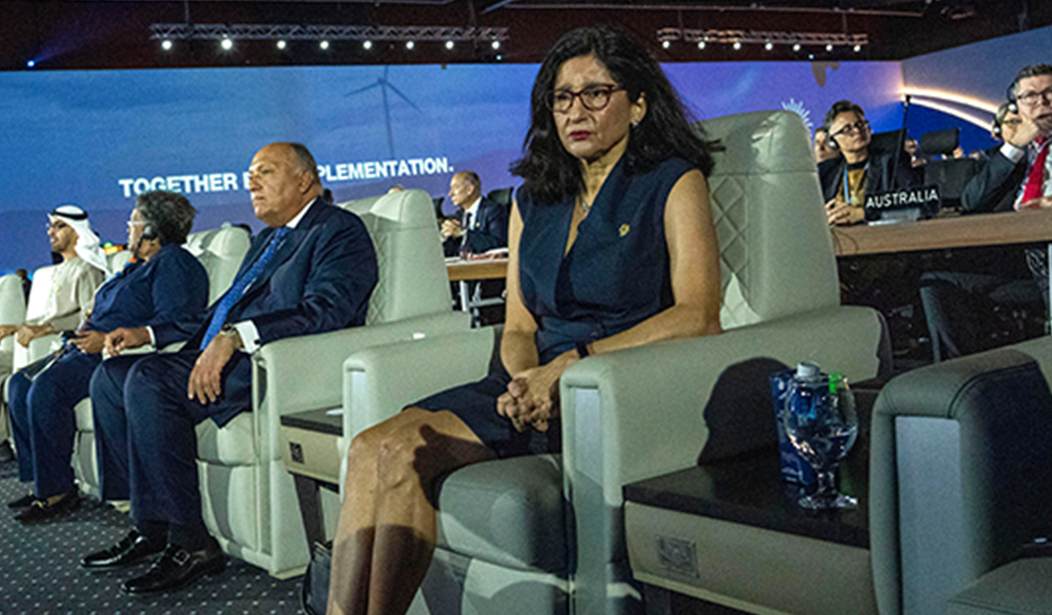And here we thought that the rest of the Poison Ivies had ridden out their anti-Semitism scandals. Late last night, the embattled president of Columbia University abruptly resigned, four months after getting humiliated in a congressional hearing.
Minouche Shafik, perhaps the worst of the Ivy League presidents at dealing with rabid anti-Semitic activists seizing campuses, became the fourth executive to step down since the October 7 atrocities touched off the crisis. Or is it the fifth?
Minouche Shafik resigned Wednesday as Columbia University’s president, ending an embattled 13-month term during which her New York City campus was the scene of a series of chaotic and sometimes violent protests by students, faculty and other activists.
Protests over the Israel-Hamas war began in October and continued through much of the winter at Columbia and many other schools. The protests intensified in April after Shafik testified before Congress. ...
She has seen tenuous support from faculty and administrators, as well as calls from some alumni and donors to resign. She is the fifth Ivy League president to step down over the past year.
Five? That's by the WSJ's count, but their link only mentions three others: Harvard's Claudine Gay, Penn's Liz Magill, and Martha Pollack of Cornell. The New York Times calls this the third resignation from the scandal, only adding Pollack parenthetically despite the same issue of anti-Semitism playing a role in her exit. Free Beacon's Eliana Johnson also only counts the three who appeared at the House hearing to get humiliated by Elise Stefanik in the spring. As of now, only MIT president Sally Kornbluth remains in place after that hearing, who refused to step down and seems to be riding out the Poison Ivy scandal.
Of course, that's what we thought about Shafik until last night, too.
To call this a surprise is an understatement. While Shafik received intense scrutiny for her incompetent and gutless leadership during the winter and spring, both she and Columbia have been out of the spotlight for months. The last mention we've made of Shafik came three months ago when she finally asked the police to take back the campus from the pro-Hamas radicals that seized Hamilton Hall and the grounds. Shafik then canceled the main graduation event on the basis of security concerns, which didn't sit well with students but did finally get Columbia out of the headlines.
So why now? For one thing, classes begin soon, and Shafik had begun planning to revamp Columbia's security policies:
Months after protests rocked Columbia University’s campus, President Minouche Shafik is proposing additional muscle for the school’s security force, including new authority to arrest protesters.
In a proposal currently under discussion among administrators, the school would add “peace officers” to its security personnel, according to people briefed on the proposal. Columbia currently has about 290 campus security personnel.
The people say it is still in early stages but could lead to peace officers with the authority to arrest and physically contact a student; current campus officers can do neither except under exceptional circumstances including self-defense. The cost, quantity of officers and even uniforms are under debate, as is whether Shafik needs approval from faculty or the university’s board.
The administration says it will seek input from faculty before implementation.
Want to take a guess how that went? Not too well, presumably, especially given the hostility she faced from the faculty that sided with the anti-Semites:
In May, the faculty of arts and sciences — which was mostly supportive of the anti-Israel encampment — approved a vote of no confidence in Shafik.
Columbia made news earlier this month when three deans who had been placed on leave over exchanging antisemitic text messages resigned.
And as recently as this week, lawmakers demanded that the school reimburse the New York Police Department for costs incurred in clearing the encampment on the Columbia campus.
Shafik tried to put a positive gloss on her resignation:
Shafik, who is British-American, went on to say she has been asked by the United Kingdom's Foreign Secretary to chair a review of the government's approach to international development, which will allow her to return to the House of Lords in the U.K. Parliament.
"I am very pleased and appreciative that this will afford me the opportunity to return to work on fighting global poverty and promoting sustainable development, areas of lifelong interest to me," she wrote.
Perhaps. But it seems highly unlikely that Shafik would have tried to float that security proposal -- which would take months of work, at least -- while considering an offer to return back home to work on "international development." It sounds more likely that she asked for "input" from Columbia's radical faculty, and ... got it in the form of robust opposition. Or perhaps the faculty liked the plan but realized that Shafik lacked the moral and intestinal fiber to implement it effectively. The events of the last two terms at Columbia certainly proved that, in spades.
In the end, it appears that Shafik's career died in that congressional hearing and the seizure of Hamilton Hall, or perhaps was on life support until the proposal for rational security pulled the plug. The only question now is whether Columbia's leadership learned the lessons of Shafik's failures, or whether they are intent on repeating them.








Join the conversation as a VIP Member